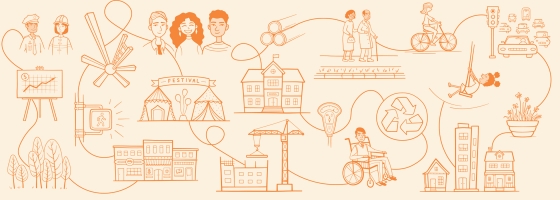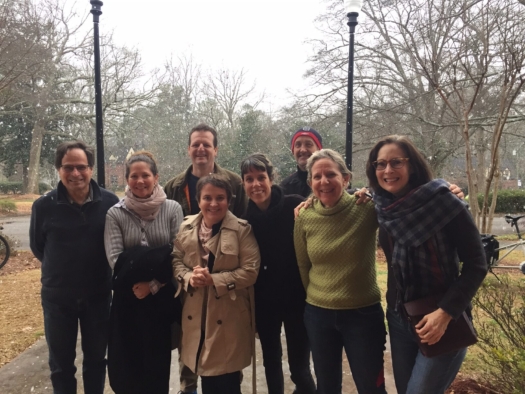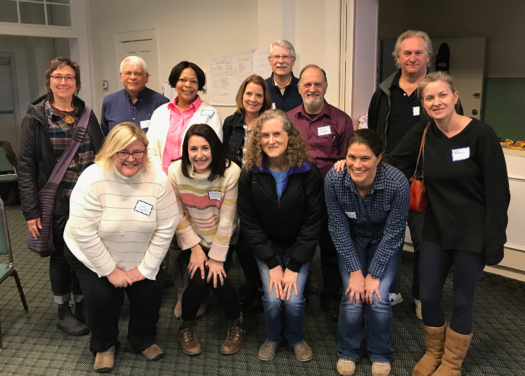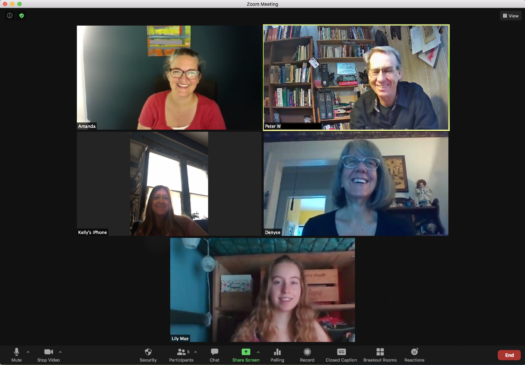It may seem like another era when we all gathered — IN PERSON! — for a boisterous kick-off of the Citizen Roundtables conversations back in January. The global pandemic intruded, forcing restrictions on how many people could physically gather in close proximity. But the work-around worked.
“I think we can all be proud of the way citizens adapted to the COVID emergency,” says Decatur Mayor Patti Garrett. “It says a lot about Decatur’s tradition of collaboration on issues important to the community’s future.”
THE ROUNDTABLES PROCESS
This report focuses on the Roundtables, the first phase of the Strategic Plan’s community participation opportunities. But first, a reminder about the Roundtables’ role.
They were designed to provide a citizen-driven foundation for building, step-by-step, towards a draft of Decatur’s 2020 Strategic Plan. Citizens signed up to participate for three facilitated conversations in small groups. The strategy behind having multiple meetings is that a progressive discussion among the same participants encourages the emergence of both shared concerns and questions about the best ways to address them. Those issues and questions, then, form the agenda for larger group sessions combining expert panels and citizen break-out conversations in the next phase of community engagement.
A PROGRESSIVE CONVERSATION
In the first Roundtable discussion, participants shared their thoughts about Decatur — what they’re proud of, what needs work, and what aspirations they hold for the future.
In the second, each group examined specific round one topics where there was no clear agreement among participants regarding how Decatur might move forward on some key issues — neighborhood zoning changes that could assist in a affordable housing and inclusivity efforts, managing traffic as we build out our walking and biking networks, and how aggressively we should address climate change at the local level.
Finally, the third Roundtable session explored how we become and stay connected — to the city, to nonprofits and civic organizations, and to each other — and how those connections can be strengthened and better leveraged in the service of addressing our challenges.
A PROCESS INTERRUPTED
The pandemic interrupted the Roundtables in March, when 17 of our 71 groups had not yet completed their second round of meetings. After a lengthy pause where it became clear safety precautions were going to be extended indefinitely, those remaining round two meetings moved largely online and were completed in August. Round three discussions, also using Zoom as their primary platform, were launched in September and scheduled independently by the groups themselves to accommodate as many participant schedules as possible.
Inevitably, there was participant attrition because of the demands on families and businesses during a pandemic. Back in January, 71 groups were formed from nearly 800 registrants. But by September’s end, just 40 of those groups were able to convene their third and final discussion and submit notes (as of this report), and many encountered challenges resulting in fewer participants.
ROUNDTABLE RESULTS
The obvious question: Did the late stage drop-off in Roundtables participation prevent us from capturing the perspectives of a broad enough cross-section of Decatur residents?
In a word no. The goal of the process was to identify key areas of concern on which to base the next phase of community discussion. And through each round, even with diminishing numbers, the groups’ conversations produced thousands of comments. Many of those comments were repeated and emphasized enough to sort into topic areas that, as the groups moved through the three rounds, could be progressively refined and organized under six broad and interconnected categories: housing and community inclusivity; climate change responses; racial equity; mobility; economic development; and civic trust.
To see how that focusing process evolved, take a look at the summaries of comments from each round below.
It’s important to realize that the big topics that emerged are not strategies. They are areas of broad concern that residents agree have to be addressed in Decatur’s next Strategic Plan. Under each of the topic categories, Roundtable participants had questions – and, in some cases, strong opinions – about how to go about addressing issues. There’s much consensus on what the Plan must address, in other words, but not yet on how to do that.
And that’s precisely where the Roundtables phase was supposed to take us, to a stage of a more focused community discussion to clarify what are likely to be hard choices for policy-making over the next decade.
“Even without the additional pressures of the pandemic,” says Mayor Garrett, “we were going to confront challenges that have grown in intensity since our last Strategic Planning process. There’s a heightened sense of urgency about the impacts of climate change, about community affordability, about racial equity – on top of all the typical planning to maintain and improve City services.
“As we might have suspected, we’ve heard from many residents who’ve said they want Decatur to be a regional leader when it comes to facing these issues head-on and committing to policies that address them. We can do that. What we can’t do is assure a better future for everyone who wants to make Decatur home by simply maintaining a status quo.”
Ahead are a series of opportunities for citizens to catch up on what they have missed as they coped with all the demands on their time during the pandemic. Everyone — from previous Roundtable participants to those new to the process — is invited to weigh in on where we are and where we’re going. We’ll be outlining those opportunities here on this site.
“Together,” says Mayor Garrett, “we’ll continue working our way through questions that help us clarify our options and build confidence in a way forward that demonstrates our commitment to solutions.”
RESOURCES
Roundtables Round 1
Comment summary and analysis for group meetings held February 8 through February 13.
Roundtables Round 2
Comment summary and analysis for group meetings held March 9 through March 13, then concluded in August, 2020.
Roundtables Round 3
Comment summary and analysis for group meetings held September, 2020.




